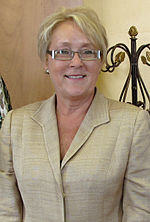About Pauline Marois
- Pauline Marois (French: [pol?n ma?w?]; born March 29, 1949) is a Canadian politician from Quebec, who served as the 30th Premier of Quebec (2012–2014) and was leader of the Parti Québécois (2007–2014).
- On September 4, 2012, Marois led her party to minority victory in the Quebec general election, thus becoming the first female premier in the province's history.
- However, her party was defeated 19 months later in the 2014 Quebec general election, an election that she herself had called.
- Marois was personally defeated in the riding of Charlevoix–Côte-de-Beaupré and announced her resignation as PQ leader.
- Her electoral defeat marked the shortest stay of any Quebec provincial government since the Canadian Confederation and the lowest showing for the PQ since its first general election in 1970.Born in a working class family, Marois studied social work at Université Laval, married businessman Claude Blanchet and became an activist in grassroots organizations and in the Parti Québécois (a social democratic party advocating Quebec's independence).
- After accepting political jobs in ministerial offices, she was first elected as a member of the National Assembly in 1981.
- At age 32, she was appointed to the cabinet for the first time as a junior minister in the René Lévesque government. After being defeated as a PQ candidate in La Peltrie in the 1985 general election and in a by-election in 1988, she was elected as the member of the Quebec National Assembly for Taillon in the 1989 general election.
- With the return of the PQ to government in 1994, premiers Parizeau, Bouchard and Landry appointed Marois to senior positions in the Quebec cabinet.
- She was instrumental in crafting policies to end confessional school boards in the public education system, she restructured the tuition system in post-secondary education, implemented a subsidized daycare program, instituted pharmacare and parental-leave plans and slashed the Quebec deficit under Premier Bouchard's "deficit zero" agenda.
- In 2001, Premier Landry appointed her Deputy Premier of Quebec, becoming the third woman after Lise Bacon and Monique Gagnon-Tremblay to assume the second-highest role in the provincial government. Following two failed leadership runs in 1985 and 2005, Marois briefly left political life in 2006.
- A year later, she stood unopposed to become the seventh leader of the Parti Québécois on June 26, 2007.
- From 2008 to 2012, she served as Leader of the Official Opposition of the National Assembly of Quebec.
- In spite of internal strife in 2011 and early 2012, where she survived several challenges to her leadership from prominent members of her caucus – earning her the nickname Dame de béton, "Concrete Lady" – she led the Parti Québécois to victory with a minority government in the 2012 Quebec general election and would serve as Premier until her government's subsequent electoral defeat in 2014.
- Her electoral defeat was despite calling an early election for April 7, 2014 in a purported gamble to obtain a majority government.
- Ultimately, her party lost with the Liberal party gaining a majority government, and Marois, herself, losing her own riding.
- Her defeat marked the shortest stay of any Quebec provincial government since Canadian Confederation.As Premier, Marois closed down Quebec's only nuclear reactor, ended asbestos production in Quebec, and pacified the province's turbulent campuses.
- Her government's highest profile initiative was the proposal of a controversial Quebec Charter of Values which would have banned the province's 600 000 government employees from wearing religious symbols including turbans, Islamic veils and Jewish kippahs.
- However, the crucifix (notably, the one hung by above the Speaker's chair in the provincial legislature) would not have been banned under the Quebec Charter of Values.
Read more at Wikipedia


 Date of Birth:
Date of Birth:  Place of Birth: Quebec City, Quebec, Canada
Place of Birth: Quebec City, Quebec, Canada